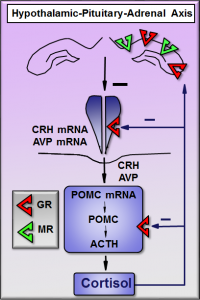
A major research focus is to understand the mechanisms of hypothalamo-pituitary-adrenocortical (HPA) development, and how these mechanisms can be modified or programmed by the fetal environment. This is important because a number of adult pathologies, including diabetes, hypertension and depression, have been associated with chronic changes in HPA function. This area has become known as the Developmental Origins of Health and Disease (DOHaD). We are particularly interested in establishing the effects of fetal exposure to glucocorticoids and maternal nutrient restriction on development of neuroendocrine function and behaviour. These studies are clinically relevant because pregnant women, at risk of delivering prematurely are treated with glucocorticoids to mature the fetal lungs. With respect to nutrient restriction, it is common for women particularly in the developing world to be undernourished during pregnancy. The effects of these perturbations on brain and neuroendocrine development are poorly understood. Most recently, we have discovered that prenatal glucocorticoid exposure and maternal undernutrition during pregnancy can lead to transgenerational influences on HPA function, cardiovascular function and behaviour. We are now investigating the mechanisms involved in this process of fetal programming. Emerging evidence from the laboratory suggests that these include altered maternal adaptation to pregnancy and epigenetic modification. Epigenetic modification or marking of the genome may represent a critical mechanism by which the environment ‘talks’ to the genome, leading to life-long alterations in susceptibility to disease. We are now beginning to translate our findings to the human. By understanding the mechanisms involved in life-long programming, we will be in a position to develop interventions focused towards preventing development of certain chronic diseases.
